 Posted by Logan Snyder on December 14th, 2020
Posted by Logan Snyder on December 14th, 2020That title? That’s just here for search engine optimization. Yup, I went there. The fact of the matter is, there is no war on Christmas keywords (There’s also not really a war on Christmas, but that’s a whole other topic!). If anything, there’s a war on other winter holiday keywords.
Let me back up. What do I mean by Christmas keywords and holiday keywords? I’m talking about search terms related to the holiday, things that people are typing into Google to find information and items. Some examples might include:
- “holiday gifts”
- “christmas lights”
- “buy a christmas tree near me”
- “solstice party”
- “hanukah games for kids”
- “christmas decorating ideas”
From a marketing and search engine optimization perspective, any of these terms that receive significant search traffic can be leveraged by brands and content creators to draw traffic in to their sites. How does this work? Without going into the details of how SEO works, creating content that contains specific phrases (say, “christmas gifts for mom” or “chocolate donuts”, see our chocolate donuts page to get an idea of “perfect” keyword density!) makes it more likely that your site will be found when people search for “christmas gifts for mom” or similar phrases like “christmas presents for mom”. If the phrase relates to something you’re selling or promoting (you have a holiday gifting blog post, or you sell “best mom ever” mugs), that traffic is valuable to you.
Things That Matter vs. Things That Don’t
There are some very specific caveats for searching on Google, specifically. For one, capitalization does not matter, so when I refer to keywords, they will all have lower case. Google also is great at synonyms, so if you’ve ever gotten the “did you mean…” redirection to appropriate search results, you’ll know what I mean (so in this example, “gifts” and “presents” are interchangeable and likely do not matter). Lesser used search engines like Bing and DuckDuckGo have their own versions of these specifics, with varying degrees of success.
What about the “war”?
Let’s get back to it: The War on Christmas. No, wait, that’s wrong. The War on “Holiday”. Keywords are only as valuable as their search volume: the number of times those terms are searched in a given time period. So if you’re creating content for “christmas gifts for mom”, you need to know whether “gifts” or “presents” is more popular to type into the search bar. You also want to know whether “holiday” or “christmas” is more popular, though!

The “War on Christmas” would have us believe that Christmas is under attack, out of fashion, perhaps just uncool. But the search volume says otherwise: “christmas” keywords are not only alive and well, they are absolutely demolishing “holiday” keywords. If there’s a War on Christmas, Christmas is winning. Take a look at these search volume statistics for “christmas gifts” and “holiday gifts”:
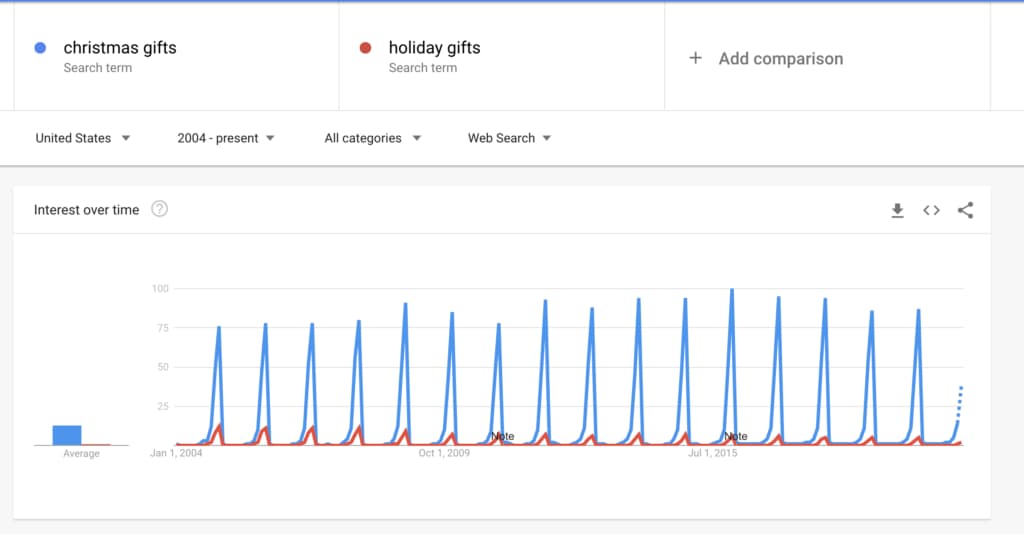
“Holiday gifts” is barely a blip next to “christmas gifts”, even though “holiday” is the broader term. I tried adding terms relating to other holidays, but they’re not even visible on the graph. To be fair, most other winter holidays lack the gifting tradition we associate with Christmas. But the trend holds across other searches:
For dinner:
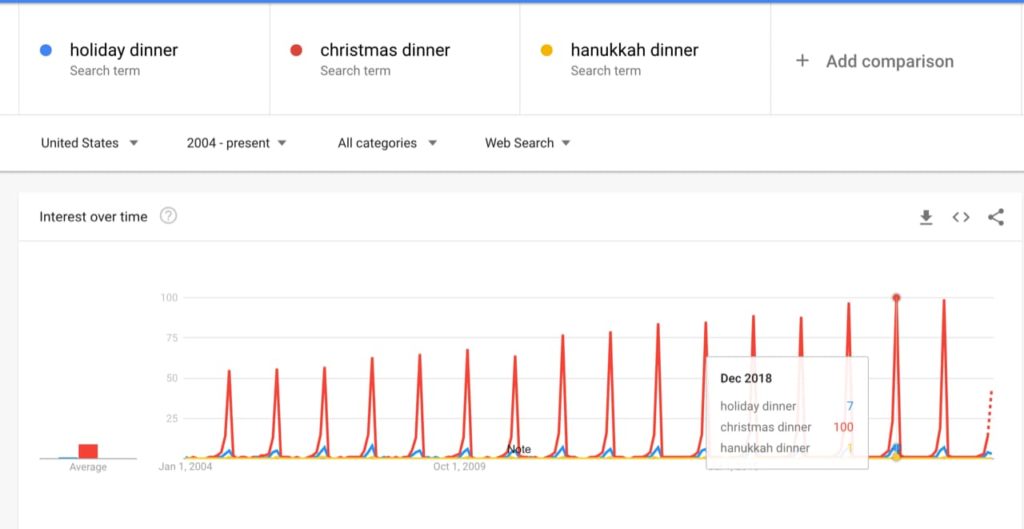
For decorating:
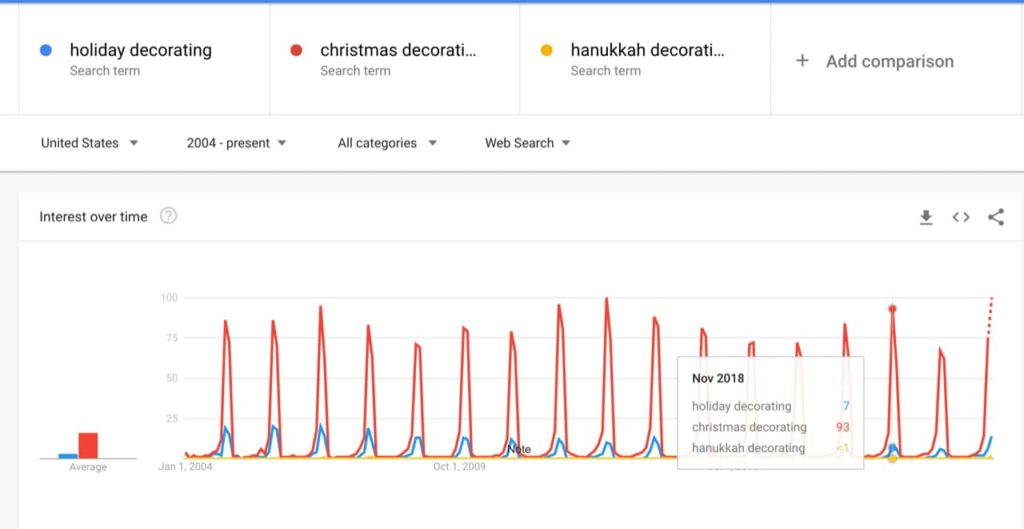
Even for just the holiday names:
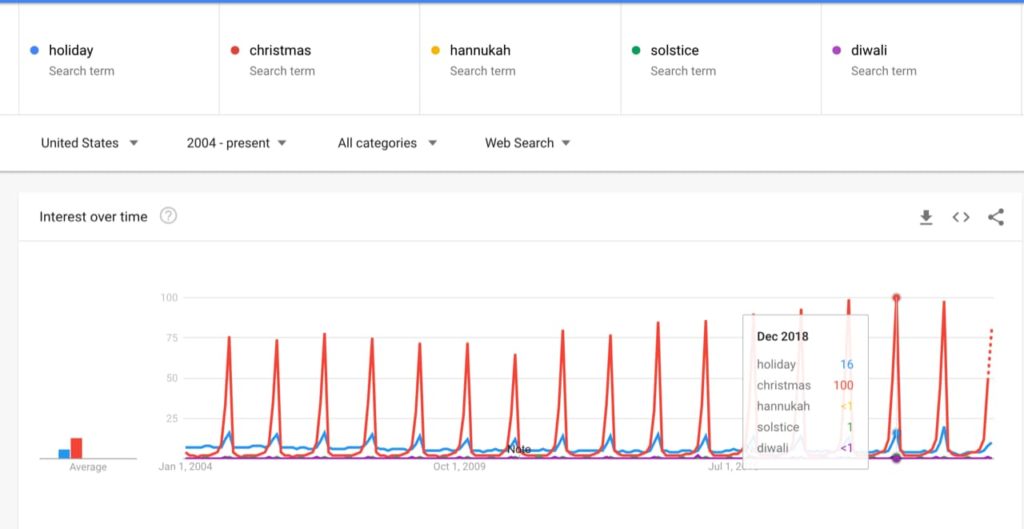
What does this mean for you?
If you’ve read this far, you’re probably interested in writing content that will attract search traffic and drive people to pages that will make you money. The obvious answer here is this: You should select keywords that have a high search volume, so as to expose your site to the most searches possible. When it comes to winter holiday search terms, that means that if you’re talking primarily about Christmas, you should just say “christmas”.
However, there’s a couple of big caveats to this conclusion. From a marketing perspective, high volume keywords are frequently also high competition keywords. More people want their content to show up for the high-volume terms, so it’s harder to get top billing in search results. With this in mind, especially on smaller or newer sites, you might want to select lower-competition search terms where you’ll have a real shot at a page 1 appearance.
The other big caveat takes us back to the so-called War on Christmas: If your company wants to be seen as inclusive of a wide range of people, cultures and holidays, you probably should use inclusive phrasing unless you’re specifically talking about a single holiday. That means “holiday gifts”, even though it’s by far the lower search term. You may lose out on some search traffic, but you can’t put a price on reputation. And if people don’t like that, keep in mind that Starbucks gets vast amounts of free publicity every year from people arguing, blogging, tweeting, and otherwise complaining about their “insufficiently Christmas-y” holiday cups. In fact, the only place where “holiday” beat out “christmas” in my trial searches was “starbucks holiday cups” vs “starbucks christmas cups”:
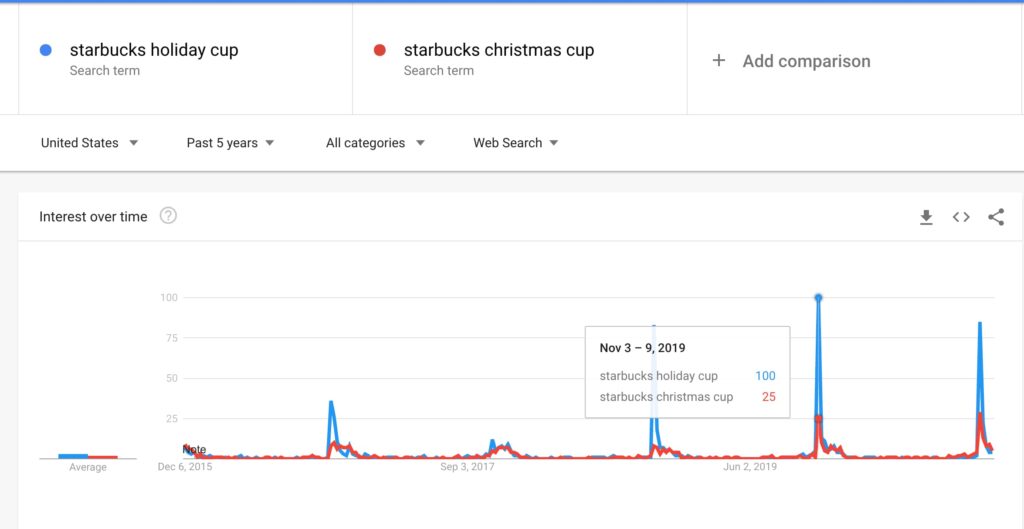
Do you need help creating content that will drive traffic? Want to work with nerds who will run all of these statistics for terms in your industry? Reach out to the highly optimized data geeks at hasOptimization.




You got me! I found my way here looking for gifts for my mom (and my kids’ grandma), but ended up learning something interesting about the internet! Thanks for the quick lesson.